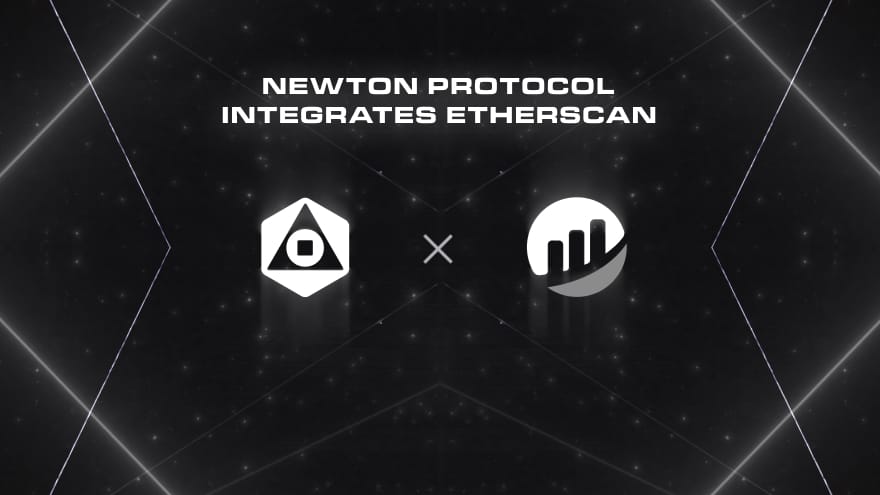Newton Protocol Integrates Etherscan Data to Power Real-Time Transaction Guardrails

As real-world assets move onchain and AI agents begin automating financial decisions, one challenge developers face frequently is that most onchain actions still execute without awareness of network conditions, leading to costly, inefficient transactions.
Today, we’re introducing the Etherscan Data Oracle, an open-source integration built on Newton Protocol that connects Etherscan’s real-time gas and network data with programmable transaction guardrails.
Bringing Etherscan Data into Newton Protocol
The Etherscan Data Oracle connects Etherscan’s Gas Tracker API to Newton Protocol’s decentralized policy engine, allowing developers to set pre-execution conditions that optimize cost and prevent unnecessary transaction failures.
With a few lines of configuration, developers can create policies that:
- Execute a transaction only when gas prices fall below a defined threshold.
- Delay or block transactions during periods of high congestion.
- Trigger a smart agent to rebroadcast or re-price transactions as network demand shifts.
Each check runs through Newton Protocol’s decentralized operator network, evaluating Etherscan data off the execution chain, verifying it for integrity, and anchoring an attestation onchain for auditability.
Example Use Cases
The Etherscan Data Oracle includes gas fee data, enabling developers to enforce cost and efficiency rules such as executing transactions only when gas prices fall below a set threshold or delaying actions during network congestion.
But this is just the starting point. Developers can easily extend or customize their own policies using other Etherscan APIs or any external data source to power richer, data-informed guardrails. Examples include:
- Contract and token checks: Only interact with approved smart contracts and wallets with a minimum balance.
- Transaction history and risk: Block transactions with wallet addresses that have suspicious transaction patterns.
- Counterparty and address risk: Use Etherscan’s address labeling (e.g., exchanges, bridges, mixers) to automatically allow or block interactions with specific counterparties based on their risk profile.
- Dynamic logic: Combine gas data with fiat price feeds, oracles, or offchain APIs to control execution timing, fees or asset exposure.
Why Newton Protocol Is Different
Most automation systems execute transactions blindly or embed static logic in smart contracts, making them rigid and opaque. Newton Protocol separates policy enforcement from execution, creating a programmable layer that is:
- Modular: Define once, apply across contracts, chains, and agents.
- Composable: Combine onchain and offchain data for adaptive transaction logic.
- Updatable: Adjust thresholds or rules without redeploying contracts.
- Verifiable: Every policy evaluation generates a cryptographic attestation visible on Newton Explorer.
- Credibly Neutral: Enforcement runs through a decentralized operator network secured by EigenLayer restaking.
Newton Protocol turns automation and compliance controls into code, giving lean teams the efficiency and assurance typically reserved for institutions with full risk and compliance operations.
Get Started
Developers can now use the Etherscan Data Oracle to bring real-time network awareness and transaction optimization into their DeFi, automation, or AI agent workflows.
👉 Head to the Developer Docs to learn how to integrate Etherscan data — along with other sources like Magic Labs, Veriff, and Vaults.fyi — into Newton Protocol policies.
With Newton Protocol, developers can compose policies with live data to meet any business, efficiency, or regulatory requirement.
About Etherscan
Etherscan is the leading blockchain explorer for Ethereum, offering APIs and analytics tools that provide transparency into blocks, transactions, contracts, and gas metrics. It serves as the go-to source for developers and institutions monitoring the Ethereum network in real time.
About Newton Protocol
Newton Protocol is a decentralized policy engine that transforms business and compliance logic into programmable policies. Developers can define, verify and enforce policies that enable real-time, privacy-preserving compliance and guardrails for RWAs, stablecoins, DeFi and AI systems.

